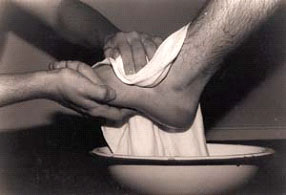Dear Parishioners,
Last weekend and this weekend we have the privilege of
gathering as a parish family at Mass as our children receive their First Holy Communion. I can recall having made my own First Holy Communion
in 1st grade with my classmates at St. Ann’s Church in
Wildwood. It was a separate ceremony
back then, on a Saturday morning (if I remember correctly). Some parishioners have asked me, “Why don’t
we do it like we used to do it all
together as a class?”
There are a number of reasons for our current practice (which,
incidentally, has been in place prior
to my arrival as pastor). Let’s first look
at our diocesan guidelines for sacramental preparation:
The preferred option for the
celebration of First Eucharist is within the Sunday Liturgy. It is the whole community, the Body of Christ
united with its Head, that celebrates [the liturgy.] Liturgical services are not private functions
but are celebrations of the Church which is the ‘sacrament of unity’ (SC 26*). Liturgical services pertain to the whole
Church. Rites are meant to be celebrated
in common, with the faithful present and actively participating, and should as
far as possible be celebrated in this way rather than by an individual or quasi-privately.
(SC 27*)
Eucharist is the crowning jewel in the sacraments of initiation and
should be celebrated within the parish worshipping community. It is recommended that the celebration take
place during the Easter Season when the Church traditionally welcomes her new
members. (Sacramental Guidelines when Sacraments of Initiation are not Celebrated Together, Diocese of Camden, 2005)
It is critical to remember that the two families that
should be most important in the children’s lives are their domestic family and their Church
family. The parents are the first (and
need to be the best) teachers of their children in the ways of faith. It is also necessary to consider that we are preparing
the children to be a part of the regular worshipping community that we
call the Church. While it may look “nice” or “cute” to have
all of the children together in one (or two) ceremonies with their classmates
and friends, it is much more essential to emphasize for them the bonds
of family
and Church. Essentially, we are not preparing them to be
with their current friends (who may not
be their friends past next week), but
to be regular, practicing members of the Catholic
Church as experienced through their local
parish family.
Let me again quote our diocesan guidelines:
Children should be made aware that
Eucharist is not a “once and done” sacrament.
Therefore, there should be encouragement to the children (and their parents)
to form good habits of weekly celebration of the Eucharist.
We all have much to
learn from each other and to teach
one another. We should rejoice to see our children share in
the sacramental life of the Catholic
Church, as lived and experienced in our parish family of St. Joseph. If the faith is not handed on to, experienced
and practiced by our young, then
eventually our Church will be nothing but a bunch of empty, lifeless buildings.
Fr. Ed Namiotka
Pastor
(*SC Sacrosanctum Concillium 12/4/63, a
document of Vatican II)
My First Holy Communion, 1967





